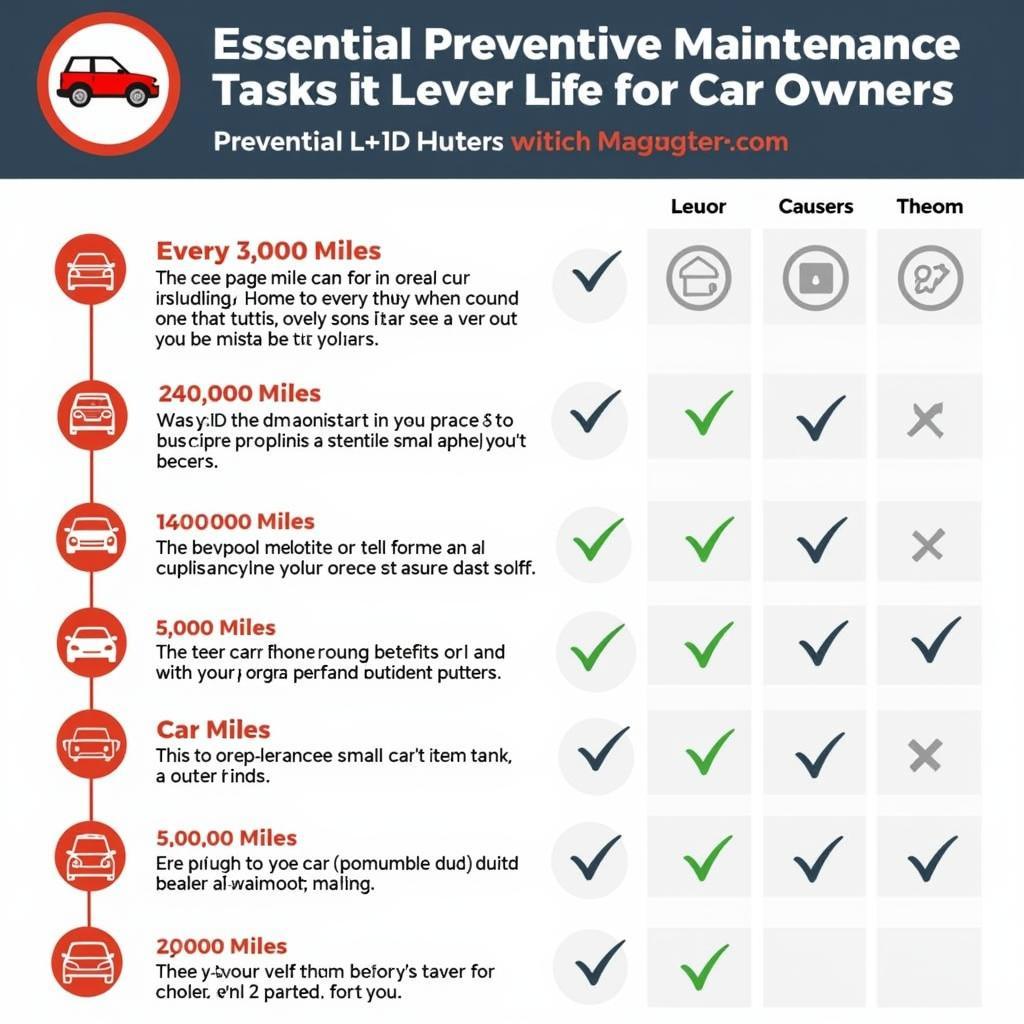Preventive maintenance on your car can absolutely save you money in the long run. Think of it like going to the dentist for regular checkups—it’s cheaper to fill a cavity than to get a root canal, right? The same principle applies to your car. Addressing small issues before they become major problems can prevent costly repairs down the road.
How Does Preventive Maintenance Save Money?
Preventive maintenance involves regular inspections, part replacements, and fluid top-offs that keep your car running smoothly and efficiently. This proactive approach can save you money in several ways:
- Avoids Costly Repairs: Catching small problems early, like a worn brake pad, prevents them from escalating into bigger, more expensive issues, like warped rotors or even a collision.
- Extends Vehicle Lifespan: Regular maintenance keeps your car’s vital components in good working order, significantly extending its lifespan and delaying the need for a new vehicle purchase.
- Improves Fuel Efficiency: Properly inflated tires, clean air filters, and regular oil changes can improve your car’s fuel economy, saving you money at the pump.
- Maintains Resale Value: A well-maintained car with a documented service history commands a higher resale value when you decide to trade it in or sell it.
What Does Preventive Maintenance Include?
Preventive maintenance encompasses a range of services tailored to your car’s make, model, and mileage. Here are some common preventive maintenance tasks:
- Regular Oil Changes: Oil is the lifeblood of your engine. Regular oil changes help lubricate moving parts, reduce friction, and prevent engine wear.
- Tire Rotations and Inflation: Rotating your tires ensures even wear and tear, extending their lifespan. Proper tire inflation also improves fuel efficiency and handling.
- Brake Inspections and Pad Replacement: Brake pads wear down over time, and regular inspections can identify when they need replacing, preventing damage to rotors and other brake components.
- Fluid Top-offs: Maintaining proper fluid levels, such as coolant, brake fluid, and power steering fluid, ensures the smooth operation of various systems.
- Air Filter Replacement: A clean air filter allows for optimal airflow to the engine, improving fuel efficiency and performance.
- Spark Plug Replacement: Spark plugs ignite the fuel-air mixture in the engine. Worn spark plugs can lead to reduced fuel economy and engine misfires.
 Car Maintenance Checklist
Car Maintenance Checklist
Is DIY Preventive Maintenance Worth It?
While some preventive maintenance tasks, like checking tire pressure or topping off fluids, can be done at home, others require specialized tools and knowledge. Consulting your owner’s manual and seeking professional assistance for more complex tasks is crucial for ensuring proper maintenance and avoiding potential damage.
“Regular maintenance is an investment, not an expense. It’s the key to keeping your car on the road longer and avoiding those dreaded surprise repair bills,” says John Smith, ASE Certified Master Technician.
Does Preventive Maintenance on My Car Save Me Money: Addressing Your Concerns
Some car owners might be hesitant to invest in preventive maintenance, questioning its cost-effectiveness. However, neglecting preventive maintenance often leads to significantly higher repair costs in the long run.
“Think of your car like your body. You need regular check-ups to stay healthy. The same goes for your car. Regular maintenance keeps it running smoothly and prevents costly problems down the road.” – Maria Garcia, Automotive Engineer.
Conclusion
Does preventive maintenance on your car save you money? Absolutely. By investing in regular checkups and addressing minor issues promptly, you can avoid expensive repairs, extend the life of your vehicle, and enjoy peace of mind on the road. Connect with us at AutoTipPro for personalized advice and assistance with your car maintenance needs. Call us at +1 (641) 206-8880 or visit our office at 500 N St Mary’s St, San Antonio, TX 78205, United States.
FAQ
- How often should I get my oil changed? Consult your owner’s manual for the recommended oil change interval.
- What are the signs my brakes need attention? Squealing or grinding noises, a soft brake pedal, or vibrations when braking are all signs your brakes need inspection.
- How can I improve my car’s fuel efficiency? Proper tire inflation, regular air filter changes, and a well-maintained engine can all contribute to better fuel economy.
- Why is preventive maintenance important for resale value? A documented service history demonstrates that the car has been well-cared for, making it more attractive to potential buyers.
- What are some simple preventive maintenance tasks I can do myself? Checking tire pressure, topping off fluids, and replacing wiper blades are relatively easy tasks you can do at home.
- How do I know what preventive maintenance my car needs? Your owner’s manual is the best resource for determining the specific maintenance needs of your car.
- What are the benefits of regular tire rotations? Tire rotations ensure even wear, extending tire life and improving handling.




Leave a Reply